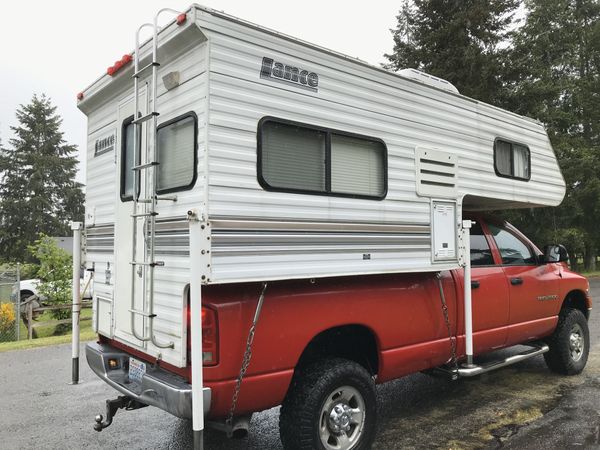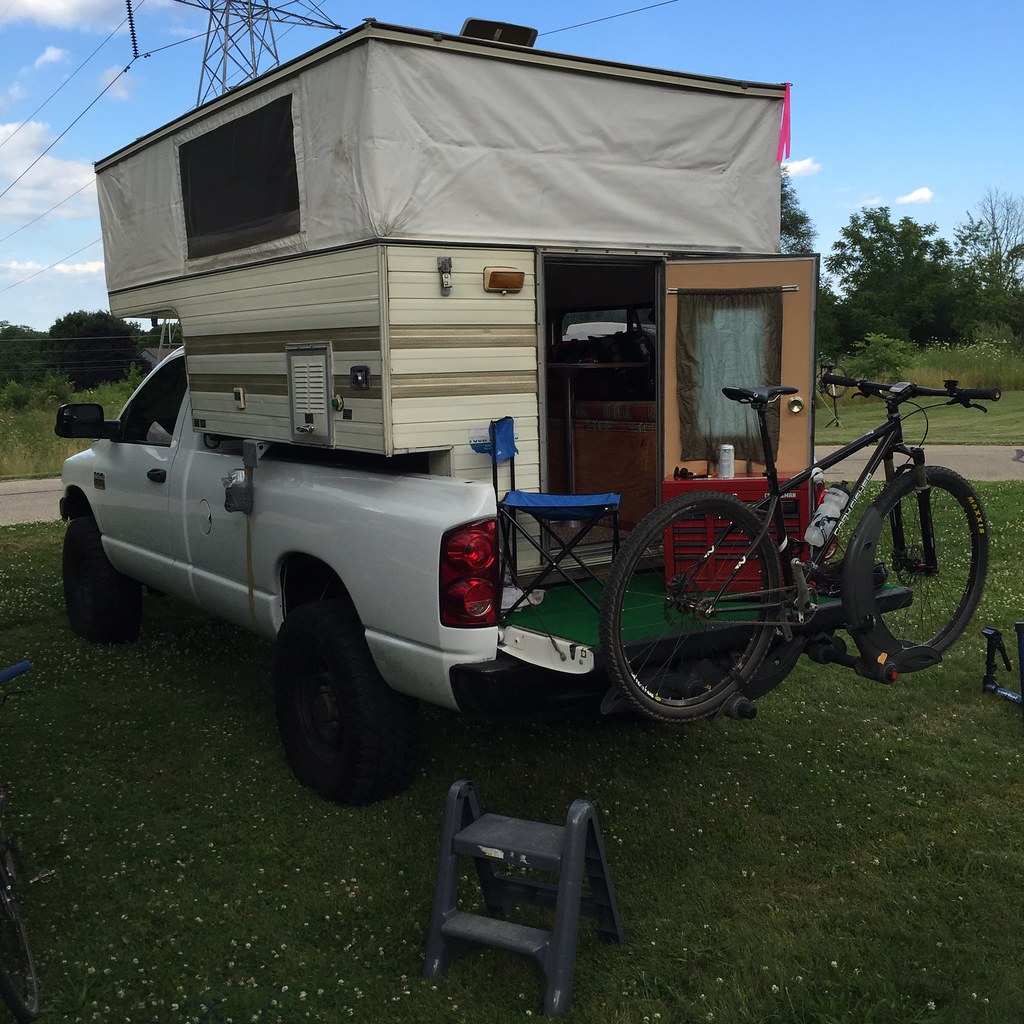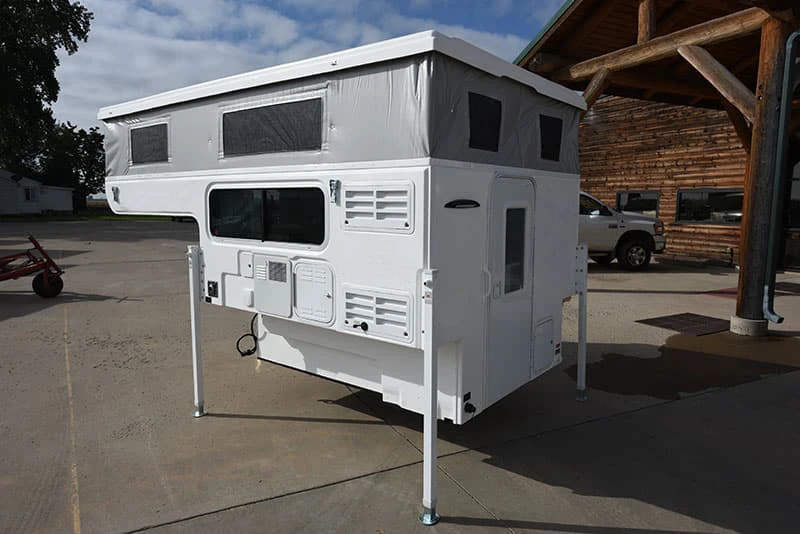Used Truck Campers For Sale By Owner: Your Comprehensive Guide to Finding the Perfect Mobile Getaway pickup.truckstrend.com
The open road calls, adventure beckons, and the desire for freedom without the bulk of a large RV or the hassle of towing is stronger than ever. For many, a truck camper offers the ideal solution: a compact, versatile, and surprisingly capable home-on-wheels that slides directly into the bed of your pickup. These self-contained units provide all the essentials – a bed, kitchen, and often a bathroom – allowing you to explore remote landscapes, enjoy spontaneous weekend trips, or even embark on long-term nomadic living.
While new truck campers come with a hefty price tag, the market for used truck campers for sale by owner has exploded, offering a treasure trove of opportunities for savvy buyers. This guide will delve into everything you need to know about navigating the private sale market, from understanding the benefits and challenges to finding, inspecting, negotiating, and ultimately, securing your ideal used truck camper. Buying directly from an owner can unlock significant savings and provide valuable insights into the camper’s history, making it a highly appealing option for those ready to embrace the truck camping lifestyle without breaking the bank.
Used Truck Campers For Sale By Owner: Your Comprehensive Guide to Finding the Perfect Mobile Getaway
Why Buy Used and By Owner? Unpacking the Benefits and Challenges
Opting for a used truck camper from a private seller offers a unique set of advantages and a few considerations you should be aware of.
The Allure of Buying Used and By Owner:
- Significant Cost Savings: This is by far the biggest draw. Used campers, like any vehicle, depreciate rapidly in their first few years. Buying used means letting someone else take that initial hit, allowing you to acquire a well-maintained unit for a fraction of its new price. Private sales typically avoid dealer markups, commissions, and hidden fees, further reducing your out-of-pocket expenses.
- Less Depreciation: A used camper will hold its value better than a new one. Should your circumstances change and you decide to sell in a few years, you’re likely to recoup a larger percentage of your initial investment.
- More Features for Your Buck: Your budget stretches further in the used market. You might be able to afford a larger camper, a hard-sided model, or one with more premium features (like solar panels, upgraded appliances, or a dry bath) than you could if buying new.
- Direct Negotiation: Dealing directly with the owner allows for more flexible negotiation on price and terms. You can often secure a better deal than through a dealership with fixed pricing.
- Access to Owner’s Knowledge: A private seller can provide invaluable insights into the camper’s history, maintenance schedule, quirks, and even tips for specific adventures they’ve had with it. This personal connection can build trust and provide peace of mind.
- Avoid Dealer Pressure and Hidden Fees: Say goodbye to high-pressure sales tactics and unexpected administrative fees that often inflate the price at dealerships.

The Realities and Potential Challenges:
- "As-Is" Condition, No Warranty: This is the primary risk. When you buy from a private seller, the camper is sold "as-is." There’s no warranty, no return policy, and no recourse if issues arise after the sale. Thorough inspection is paramount.
- More Legwork Required: You’re responsible for all aspects of the transaction – finding the camper, arranging inspections, negotiating, handling paperwork, and potentially arranging financing. This requires time and diligence.
- Potential Hidden Issues: Without a professional inspection or a dealer’s reconditioning process, there’s a higher chance of encountering hidden problems that only become apparent after purchase.
- Financing Can Be Harder: While possible, securing a loan for a private sale of an older recreational vehicle can be more challenging than for a new one or a dealer sale. Lenders may have stricter requirements or higher interest rates.


Understanding Truck Camper Types and Crucial Compatibility
Before you start your search, it’s vital to understand the different types of truck campers and, most importantly, how they must perfectly match your truck’s specifications.
Types of Truck Campers:
- Pop-Up Truck Campers: These feature a lower profile for better aerodynamics and off-road clearance. The roof "pops up" when camped, revealing canvas sides (or soft walls) and standing room. They are generally lighter, making them suitable for smaller trucks or those with lower payload capacities.
- Hard-Sided Truck Campers: These offer rigid walls, providing better insulation, security, and a more robust feel. They are heavier and taller, requiring a truck with a substantial payload capacity and often a larger engine. They are ideal for four-season camping.
- Slide-in Campers: The most common type, these units slide directly into the bed of a pickup truck. They are secured to the truck frame via tie-downs.
- Chassis-Mount Campers: Less common in the used by owner market, these are permanently mounted to a bare truck chassis, replacing the truck bed entirely.
Critical Truck-to-Camper Compatibility:
This is the single most important factor. An improperly matched camper can lead to dangerous driving conditions, excessive wear on your truck, and even void your truck’s warranty.
- Payload Capacity: This is paramount. Every truck has a maximum payload capacity (found on a sticker in the door jamb or in the owner’s manual). This is the maximum weight your truck can safely carry, including the camper’s wet weight (camper’s dry weight + water + propane + gear + passengers in the truck). Never exceed your truck’s payload capacity.
- Truck Bed Length: Campers are designed for specific bed lengths:
- Short Bed (typically 5.5′ – 6.5′): Short bed campers are popular but often smaller and lighter.
- Long Bed (typically 8′): Long bed campers offer more living space and can accommodate larger amenities.
- Some campers are designed to fit both, but check for proper weight distribution and potential overhang.
- Single Rear Wheel (SRW) vs. Dual Rear Wheel (DRW): Heavier, larger hard-sided campers often require a dually truck (DRW) for stability and higher payload capacity. Smaller pop-ups and lighter hard-sides can work with SRW trucks.
- Truck Model and Year: Ensure the camper’s design (e.g., cab-over clearance) is compatible with your truck’s specific make and model.
The Search: Where to Find Used Truck Campers By Owner
The internet has revolutionized the private sale market. Here are the best places to begin your quest:
- Online Marketplaces:
- Craigslist: A classic for local private sales. Be prepared to filter out scams and deal with a wide range of sellers. Search widely in surrounding cities.
- Facebook Marketplace: Increasingly popular for local sales, offering an easy way to view photos and communicate with sellers. Join specific "Truck Camper" or "RV For Sale" groups on Facebook for targeted listings.
- RVTrader.com (Filter by Owner): While primarily a dealer site, RVTrader allows you to filter listings to show "For Sale By Owner" vehicles, offering a broader geographic reach.
- eBay Motors: Good for unique or higher-end campers, often with auction-style bidding or "Buy It Now" options.
- Specialized Forums and Communities: Websites like RV.net, Truck Camper Magazine forums, and various brand-specific forums (e.g., Lance Owners Forum) often have "For Sale" sections where owners list their campers. These communities can also be a great source of information and advice.
- Local Ads and Word of Mouth: Check local newspaper classifieds (less common now), community bulletin boards, and let friends and family know you’re looking. Sometimes the best deals are found through personal connections.
The Inspection Process: What to Look For (Your Due Diligence Checklist)
This is the most critical step. Treat it like a home inspection and a vehicle inspection rolled into one. Bring a flashlight, a moisture meter (highly recommended!), and a friend if possible.
Exterior Inspection:
- Roof: The number one area for leaks. Look for cracks, tears, soft spots, peeling sealant around vents, skylights, and seams. Check for signs of previous repairs.
- Seals and Caulking: Inspect all window, door, and trim seals for cracks, gaps, or deterioration.
- Siding: Look for delamination (bubbles or waves), cracks, dents, or signs of impact damage.
- Windows and Doors: Check for proper sealing, smooth operation, and any signs of water intrusion around frames.
- Jacks: Ensure all four jacks operate smoothly, are not bent, and are securely mounted.
- Frame Integrity: Look underneath for rust, damage, or signs of structural issues.
- Underbelly: Check for exposed wires, pipes, or damage from road debris.
Interior Inspection:
- Water Damage: This is the silent killer. Look for water stains on walls, ceilings, and floors. Feel for soft spots on the floor, especially near the entry door, shower, and around windows. Use a moisture meter in suspicious areas.
- Mold and Mildew: Look and smell for signs of mold, which often accompanies water damage.
- Appliances:
- Refrigerator: Test on both propane and electric. Does it get cold?
- Furnace: Turn it on. Does it cycle properly and blow warm air?
- Air Conditioner: Does it blow cold air?
- Water Heater: Test with propane and electric. Does it heat water effectively?
- Stove/Oven: Test all burners and the oven (if present).
- Microwave: Does it power on?
- Plumbing:
- Water Pump: Turn it on. Does it build pressure and hold it?
- Faucets: Check for leaks under sinks.
- Toilet: Flush it. Does it hold water?
- Tanks: Ask about the condition of fresh, grey, and black water tanks. Look for leaks.
- Electrical System:
- 12V System: Test all lights, fans, and outlets. Check the battery (age, condition).
- 110V System: Plug into shore power (if available) and test all outlets. Check the converter/inverter.
- Solar (if applicable): Ask about the system’s performance and battery bank.
- Flooring, Cabinetry, Upholstery: Check for wear, damage, or soft spots. Ensure all drawers and doors open and close properly.
- Propane System: Check the tank, lines, and detector. Look for rust on the tank.
- Awning: Extend and retract fully. Check for rips or damage to the fabric and frame.
- Odor: Any persistent musty, moldy, or strong chemical smells can indicate underlying issues.
- Documentation: Ask for the camper’s title (ensure it’s clear), owner’s manuals, and any maintenance records.
Negotiation and Purchase Tips
Once you’ve found a promising camper and completed your thorough inspection, it’s time to talk turkey.
- Do Your Homework on Pricing: Research comparable sales in your area. Websites like RVUSA, RVTrader, and NADA Guides can give you a ballpark figure, but remember private sales are often lower than dealer prices.
- Be Prepared: Have your financing pre-approved or cash ready. This shows you’re a serious buyer.
- Start Lower, Justify Your Offer: Don’t be afraid to make an offer below the asking price. Use any issues found during your inspection to justify a lower offer.
- Test Everything (Again): Before finalizing the deal, ask the seller to demonstrate that all systems are operational.
- Paperwork is Key:
- Bill of Sale: Create a detailed Bill of Sale that includes the camper’s make, model, year, VIN, sale price, date, and the names/signatures of both buyer and seller. State that it’s sold "as-is."
- Title Transfer: The seller must provide a clear title, properly signed over to you. Understand your state’s requirements for title transfer and registration.
- Consider an Escrow Service: For higher-value campers, an escrow service can protect both buyer and seller, ensuring funds and title are exchanged properly.
- Trust Your Gut: If something feels off, walk away. There will always be other campers.
Post-Purchase Considerations
Congratulations, you’re now a truck camper owner! But the journey doesn’t end there.
- Insurance: Get your new camper insured immediately. Most auto insurance policies won’t cover a slide-in camper unless it’s specifically added as an endorsement or a separate RV policy.
- Registration: Register the camper with your state’s DMV according to local laws. Some states title and register slide-in campers, others do not.
- Maintenance: Create a maintenance schedule for your camper, just like you would for your truck. This includes roof seal inspection, appliance servicing, and winterization.
- Minor Repairs and Upgrades: Budget some funds for immediate minor repairs or desired upgrades to truly make the camper your own.
Used Truck Campers For Sale By Owner: Estimated Price Range
Prices for used truck campers vary wildly based on brand, age, condition, features, and region. The table below provides a general estimate for private sales, but individual deals will differ.
| Camper Type | Age Range | Condition | Estimated Price Range (By Owner) | Key Considerations |
|---|---|---|---|---|
| Pop-Up Camper | 15+ Years Old | Fair – Good | $3,000 – $8,000 | Lighter, often simpler, check canvas/soft wall integrity. |
| 5-15 Years Old | Good – Very Good | $8,000 – $18,000 | Good balance of features and value. | |
| Under 5 Years Old | Excellent | $18,000 – $30,000+ | Near-new condition, minimal depreciation. | |
| Hard-Sided Short Bed | 15+ Years Old | Fair – Good | $5,000 – $12,000 | Check for water damage, appliance functionality. |
| 5-15 Years Old | Good – Very Good | $12,000 – $25,000 | Popular segment, many options. | |
| Under 5 Years Old | Excellent | $25,000 – $45,000+ | Modern features, higher payload needed. | |
| Hard-Sided Long Bed | 15+ Years Old | Fair – Good | $7,000 – $15,000 | Larger, often requires 3/4 or 1-ton truck. |
| 5-15 Years Old | Good – Very Good | $15,000 – $35,000 | More living space, check for structural issues. | |
| Under 5 Years Old | Excellent | $35,000 – $60,000+ | High-end features, often for heavy-duty trucks. |
Note: These are estimates for private sales and can vary significantly. Premium brands (e.g., Lance, Arctic Fox, Host) will typically command higher prices across all categories and ages.
Frequently Asked Questions (FAQ) about Used Truck Campers For Sale By Owner
Q1: How do I know if a used truck camper will fit my truck?
A1: You must match the camper’s weight (wet weight, including water, propane, gear, and people) to your truck’s payload capacity. Also, ensure the camper’s bed length (short or long) matches your truck’s bed. Check your truck’s door jamb sticker or owner’s manual for its specific payload rating.
Q2: What are the most common problems to look for in a used truck camper?
A2: Water damage (leaks leading to rot, mold, delamination) is the most prevalent and serious issue. Followed by appliance failures (refrigerator, furnace, water heater), electrical issues, and problems with the roof and seals.
Q3: Can I get financing for a private sale of a used truck camper?
A3: Yes, but it can be more challenging than dealer financing. Some banks and credit unions offer RV loans for private sales, but they may have age restrictions on the camper or require a higher down payment. Shop around for lenders who specialize in recreational vehicle loans.
Q4: Should I get a professional inspection before buying?
A4: Highly recommended, especially for higher-value campers or if you’re not comfortable with DIY inspections. A certified RV technician can uncover hidden issues you might miss, providing peace of mind or leverage for negotiation.
Q5: What paperwork do I need to complete the sale of a used truck camper by owner?
A5: You will need a signed Bill of Sale (detailing the camper, price, date, and "as-is" condition) and the camper’s clear title, properly signed over by the seller. Check your local DMV’s requirements for title transfer and registration.
Q6: How much should I expect to pay for insurance for a used truck camper?
A6: Insurance costs vary widely based on the camper’s value, your driving record, the coverage you choose (liability, collision, comprehensive), and your location. Expect it to be an additional cost on top of your truck’s insurance. Some policies allow it to be an endorsement on your truck policy, while others require a separate RV policy.
Conclusion
The journey to finding your ideal used truck camper for sale by owner is an exciting one, filled with potential for incredible value and memorable adventures. By understanding the unique benefits of private sales – primarily significant cost savings and direct communication with the seller – you’re already ahead of the game. However, success hinges on meticulous research, a thorough inspection process to mitigate the "as-is" risk, and confident negotiation.
Remember to prioritize compatibility with your truck, meticulously inspect for water damage and appliance functionality, and handle all paperwork diligently. While buying by owner requires more effort on your part, the reward is a versatile, mobile basecamp that empowers you to explore off the beaten path, create unforgettable memories, and truly embrace the freedom of the open road, all while staying within your budget. Your perfect adventure companion is out there, waiting for you to discover it.



